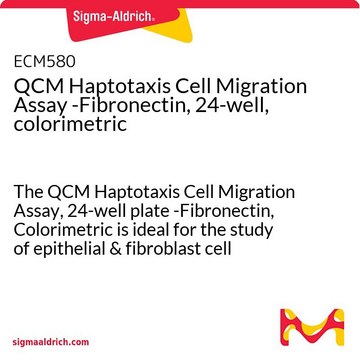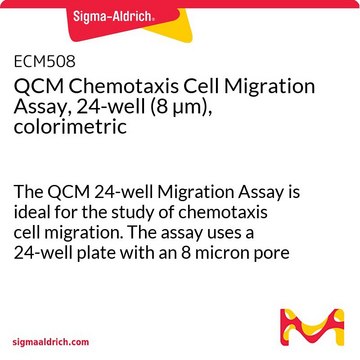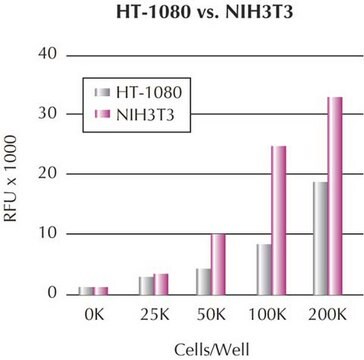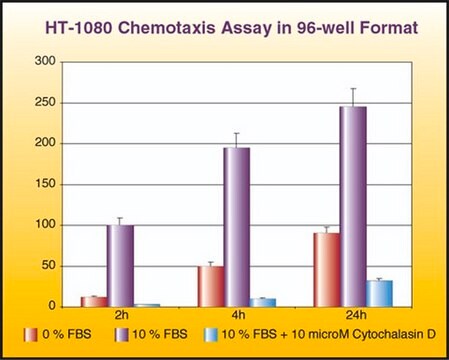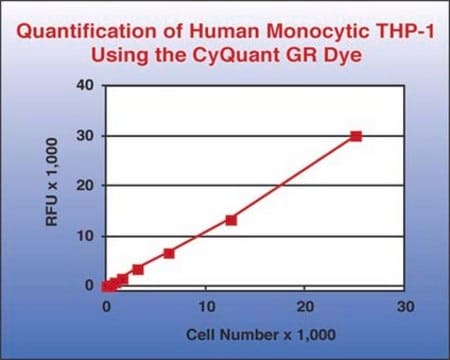ECM582
QCM Haptotaxis Cell Migration Assay -Collagen I, 24-well, colorimetric
The QCM Haptotaxis Cell Migration Assay, 24-well plate -Collagen 1, Colorimetric is ideal for the study of epithelial & fibroblast cell haptotaxis.
Anmeldenzur Ansicht organisationsspezifischer und vertraglich vereinbarter Preise
Alle Fotos(1)
About This Item
UNSPSC-Code:
12352207
eCl@ss:
32161000
NACRES:
NA.84
Empfohlene Produkte
Qualitätsniveau
Speziesreaktivität
vertebrates
Hersteller/Markenname
Chemicon®
QCM
Methode(n)
cell based assay: suitable
Nachweisverfahren
colorimetric
Versandbedingung
wet ice
Allgemeine Beschreibung
Also available: Cell Comb Scratch Assay! Get biochemical data from a scratch assay!Click Here
Introduction
The CHEMICON QCM Haptotaxis Cell Migration Assay - Collagen 1, Colorimetric is ideal for the study of epithelial and fibroblast cell haptotaxis. The quantitative nature of this assay is especially useful for large scale screening of pharmacologic agents. BSA-coated control chambers provide an appropriate migration control. The 8 μm pore size of this assay′s Boyden chambers is not appropriate for the study of lymphocyte migration.
• Each kit provides sufficient materials for the evaluation of 12 samples.
• Please refer to the product insert for assay details.
The CHEMICON QCM Haptotaxis Cell Migration Assay - Collagen 1, Colorimetric assay is intended for research use only; not for diagnostic applications.
Introduction
The CHEMICON QCM Haptotaxis Cell Migration Assay - Collagen 1, Colorimetric is ideal for the study of epithelial and fibroblast cell haptotaxis. The quantitative nature of this assay is especially useful for large scale screening of pharmacologic agents. BSA-coated control chambers provide an appropriate migration control. The 8 μm pore size of this assay′s Boyden chambers is not appropriate for the study of lymphocyte migration.
• Each kit provides sufficient materials for the evaluation of 12 samples.
• Please refer to the product insert for assay details.
The CHEMICON QCM Haptotaxis Cell Migration Assay - Collagen 1, Colorimetric assay is intended for research use only; not for diagnostic applications.
Anwendung
Research Category
Zellstruktur
Zellstruktur
Verpackung
Sufficient for analysis of 12 samples
Komponenten
Collagen 1 Test Plate: (Part No. 2005690) One 24-well culture plate, containing 12 human Collagen 1 coated Boyden chambers, sufficient for the evaluation of 12 test samples.
BSA Control Plate: (Part No. 2005791) One 24-well culture plate, containing 12 BSA-coated Boyden chambers, sufficient for the evaluation of 12 controls.
Cell Stain Solution*: (Part No. 20294) One vial - 10 mL.
Extraction Buffer: (Part No. 20295) One vial - 10 mL.
24 well Stain Extraction Plate: (Part No. 2005871). One plate.
96 well Stain Quantitation Plate: (Part No. 2005870). One plate.
Swabs: (Part No. 10202) 50 each.
Forceps: (Part No. 10203) 1 pair
*Cell Stain Solution contains a small amount of crystal violet, which is toxic if swallowed or inhaled, and may cause irritation to the eyes, respiratory system, and skin. Handle with caution.
BSA Control Plate: (Part No. 2005791) One 24-well culture plate, containing 12 BSA-coated Boyden chambers, sufficient for the evaluation of 12 controls.
Cell Stain Solution*: (Part No. 20294) One vial - 10 mL.
Extraction Buffer: (Part No. 20295) One vial - 10 mL.
24 well Stain Extraction Plate: (Part No. 2005871). One plate.
96 well Stain Quantitation Plate: (Part No. 2005870). One plate.
Swabs: (Part No. 10202) 50 each.
Forceps: (Part No. 10203) 1 pair
*Cell Stain Solution contains a small amount of crystal violet, which is toxic if swallowed or inhaled, and may cause irritation to the eyes, respiratory system, and skin. Handle with caution.
Verlinkung
Replaces: ECM502
Lagerung und Haltbarkeit
Store at 4°C for up to one year after date of purchase.
Rechtliche Hinweise
Accutase is a registered trademark of Innovative Cell Technologies, Inc.
CHEMICON is a registered trademark of Merck KGaA, Darmstadt, Germany
Haftungsausschluss
Unless otherwise stated in our catalog or other company documentation accompanying the product(s), our products are intended for research use only and are not to be used for any other purpose, which includes but is not limited to, unauthorized commercial uses, in vitro diagnostic uses, ex vivo or in vivo therapeutic uses or any type of consumption or application to humans or animals.
Signalwort
Danger
H-Sätze
Gefahreneinstufungen
Eye Irrit. 2 - Flam. Liq. 2
Lagerklassenschlüssel
3 - Flammable liquids
WGK
WGK 3
Analysenzertifikate (COA)
Suchen Sie nach Analysenzertifikate (COA), indem Sie die Lot-/Chargennummer des Produkts eingeben. Lot- und Chargennummern sind auf dem Produktetikett hinter den Wörtern ‘Lot’ oder ‘Batch’ (Lot oder Charge) zu finden.
Besitzen Sie dieses Produkt bereits?
In der Dokumentenbibliothek finden Sie die Dokumentation zu den Produkten, die Sie kürzlich erworben haben.
Mariel Maldonado et al.
American journal of respiratory cell and molecular biology, 59(1), 77-86 (2018-01-27)
Idiopathic pulmonary fibrosis (IPF) is a chronic and progressive aging-associated disease of unknown etiology. A growing body of evidence indicates that aberrant activated alveolar epithelial cells induce the expansion and activation of the fibroblast population, leading to the destruction of
Nilgun Tasdemir et al.
Scientific reports, 10(1), 11487-11487 (2020-07-15)
Invasive lobular carcinoma (ILC) is a histological subtype of breast cancer with distinct molecular and clinical features from the more common subtype invasive ductal carcinoma (IDC). ILC cells exhibit anchorage-independent growth in ultra-low attachment (ULA) suspension cultures, which is largely
Unser Team von Wissenschaftlern verfügt über Erfahrung in allen Forschungsbereichen einschließlich Life Science, Materialwissenschaften, chemischer Synthese, Chromatographie, Analytik und vielen mehr..
Setzen Sie sich mit dem technischen Dienst in Verbindung.